Mortgage crisis looms for Trinidad and Tobago’s housing market
Trinidad and Tobago’s economy is struggling. Dependence on oil and gas reserves has shown itself a mixed blessing in recent years when oil markets have been weak. Tourist arrivals continue to fall. And the weak economy, following an earlier boom, means that a mortgage crisis may be looming.
The country recovered more slowly from the global financial crisis than some neighbors, with property prices falling 20% from 2007 to 2009. That was because foreign homebuyers, who mostly come from Britain, Germany, the United States and Canada, were blocked by a requirement introduced in 2007 that foreign investors obtain a license for land purchases in Tobago.
Things have now got worse. After a short-lived recovery in 2015, the housing market contracted again in 2016 and has remained flat since, due to the decline in oil prices.
The economy contracted by 6.5% in 2016 and by 2% in 2017, before minuscule growth of 0.3% in 2018. Zero growth is expected this year, according to the International Monetary Fund (IMF).
The economy is struggling
Trinidad and Tobago is one of the Caribbean’s richer nations. Trinidad depends heavily on oil and gas production, which accounts for more than 40% of GDP and 85% of merchandise exports. Tobago, which has a wealth of secluded beaches and rainforests, benefits from the larger island’s prosperity.
During a massive housing boom from 1991 to 2006 house prices surged by more than 400%. Foreign investment poured in. Much new private housing was built in Port of Spain, in the northwest region, and in the area around Point Lisas Industrial Estate, the centre of Trinidad and Tobago’s petrochemical industry.
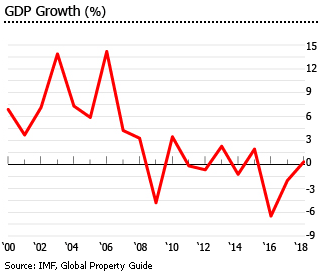
The country enjoyed strong economic growth from 1996 to 2007, with an average GDP growth of 8% annually. However wealth does not bring immunity from recession.
The global recession hit demand sharply. Projects were uncompleted or halted. Foreign investment fell, and unemployment rose - reaching almost 6% in 2010. Financial and investor confidence also tumbled with the collapse of CL Financial, Trinidad and Tobago’s largest privately-held conglomerate (and one of the largest in the Caribbean).
In 2009 Trinidad and Tobago’s GDP contracted by 4.8%. Then the government introduced a new property tax - a 3% tax rate on residential property and a 5% tax rate on commercial property, based on 90% of annual rentable value. This aroused a lot of anger. The reform was suspended after former PM Kamla Persad-Bissessar was elected in May 2010, and the previous Lands and Buildings Taxes Act rates and values were reintroduced.
There was recovery in 2010 with 3.5% GDP growth but the economy contracted again by 0.2% in 2011 and has remained sluggish since. GDP reductions of -6.5% in 2016 and -2% in 2017 followed the crash in oil prices from 2014 to 2016.
After growing by a minuscule 0.3% in 2018, the economy is expected to see zero growth this year, as the government continues to face the dual challenge of gas shortages and a low price environment. However, large-scale energy projects, such as the Angelin Gas Project, are helping to mitigate the gas shortages.
The housing market started to recover by end-2014 and house prices even increased in 2015. However, house prices started to fall again in 2016, mainly due to the adverse impact of the oil price crash. Demand declined sharply, as unemployment increased and expatriates left the country.
House prices in the islands now range from around TT$1 million (US$147,400) to TT$8 million (US$1.18 million) - though of course there are super-luxurious and also low-end houses that fall outside this range.
The median house price currently stands at around TT$1.3 million (US$ 191,674), according to the Central Bank of Trinidad and Tobago.
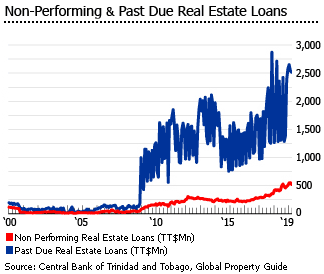
In Trinidad, the price of one-bedroom apartments typically ranges from TT$900,000 (US$132,700) to TT$1.5 million (US$221,200). In the desirable neighborhoods of West Trinidad, modern homes are priced from about TT$3.7 million (US$545,500). Residential lots in Trinidad sell for around TT$40 (US$6) to TT$55 (US$8) per square foot (sq. ft.).
At The Crossings, located on the outskirts of the bustling town of Arima in Trinidad, three bedroom houses are currently being offered from around TT$1.8 million (US$265,400) to TT$2.2 million (US$324,400). On the other hand, residential land in The Crossings sells for less than TT$120 (US$18) per sq. ft.
In Tobago, the price of small condominiums starts at around TT$2.4 million (US$353,900) while single-family homes start at about TT$3.4 million (US$501,300).
In Trinidad, foreigners can buy up to one acre of property for residential use without a license. In Tobago, by contrast, no license has been issued to foreign buyers since the requirement for licenses was introduced in October 2007.
Buyers pay stamp duty ranging from 0% to 7.5%, plus legal fees which typically amount to 1.5% of the purchase price.
A mortgage market crisis looms
The housing market´s decline has brought the usual problems, not helped by the fact that the mortgage market in Trinidad and Tobago had been growing very rapidly. Mortgage loans outstanding surged by 37.2% annually, on average, from 2004 to 2018 (growing from 0.8% to 14.2% of GDP), according to the Central Bank of Trinidad and Tobago.
Now an increasing number of homeowners are struggling with their monthly payments. Past due real estate loans climbed by almost 30% y-o-y to TT$2.54 billion (US$374.38 million) in January 2019, according to the Central Bank of Trinidad and Tobago. Non-performing real estate bank loans stand about 28 times higher than in the pre-crisis year of 2007.
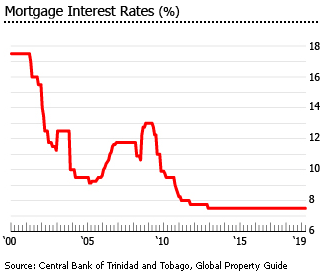
The average mortgage interest rate was 7.5% in May 2019, unchanged since November 2012. Commercial banks´ basic prime lending rate was 9.26%. The central bank’s repo rate has been 5% since June 2018., according to the Central Bank of Trinidad and Tobago.
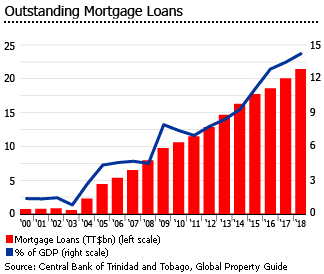
To support housing demand, the Residential Stamp Duty threshold has been reduced for first-time homeowners from TT$850,000 (US$125,300) to TT$1,500,000 (US$221,160), saving homebuyers TT$37,000 (US$5,455) on closing costs.
| BEFORE AMENDMENT | AFTER AMENDMENT | ||
| Band | Stamp Duty | Band | Stamp Duty |
| First TT$850,000 | 0 | 0 | |
| TT$850,000 – TT$1,250,000 | TT$12,000 | First TT$1,500,000 | |
| TT$1,250,000 – TT$1,500,000 | TT$12,500 | ||
| Total | TT$24,500 | Total | 0 |
The expat rental market
The economic downturn has caused an outflow of foreign renters. As a result, rents for a large number of properties have fallen substantially.
For the expatriate and upper-income markets, there is a wide range of residential rents - from TT$9,500 (US$1,400) to TT$95,000 (US$14,000) per month.
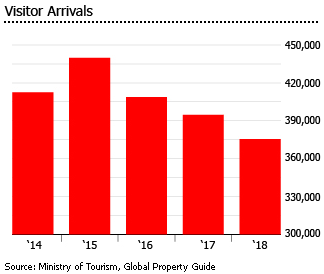
For the local market, more particularly the middle income market, residential rents for apartments and properties in gated communities typically range from TT$3,000 (US$443) to TT$20,000 (US$2,950).
Some of the most attractive locations to rent or buy in Trinidad are:
- Westmoorings - upscale Port of Spain suburb, with high-rise apartment complexes
- Goodwood Park - exclusive neighbourhood near Port of Spain, with large private houses
- Bayside Towers - new luxurious apartment complex
- The Greens, Maraval Valley - modern, luxurious gated community
New airport, marina to boost tourism
In 2018, tourist arrivals fell by 4.9% y-o-y to 375,485 people, following declines of 3.5% in 2017 and 7% in 2016, according to the Ministry of Tourism.
To reverse this decline a new airport terminal at ANR Robinson International Airport in Crown Point is being built, to be completed in 2020. In addition, the government has decided to develop a marina at Canoe Bay.
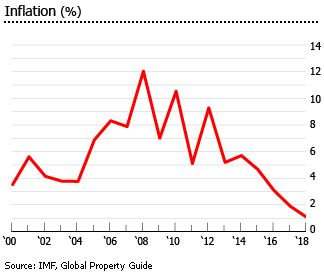
In 2018, the country’s overall inflation rate stood at 1%, down from 1.9% in the previous year and the lowest level in 54 years, according to the Central Bank of Trinidad and Tobago. Inflation averaged 6% from 2000 to 2017.
In the past several years, the government has prioritized economic diversification, focusing its efforts not just in the energy sector, but also in the non-energy sector and services sector.
While many local residents in Trinidad and Tobago are prosperous, 17% of the population lives below the poverty line. Crime involving drugs, guns, and gangs remains a challenge, particularly in Trinidad, with murders and kidnappings topping the list.
Construction of affordable housing
The construction industry is getting a boost from the government’s development plan "Vision 2020", which consists mainly of construction projects. In 2018, the government has allocated more than TT$1 billion (US$147.4 million) for the construction of affordable housing.
Other government initiatives to improve the housing situation in Trinidad and Tobago include:
- The recently established Aided Self-Help Housing Programme allows homeowners to construct their own homes with state support, according to Firstline Securities Limited. From November 2017 to January 2018, the program already received about 5,000 applications; 700 of them were randomly chosen to receive help with the construction of a new home in 2019.
- Under the Housing and Village Improvement Programme, affordable houses are currently under construction on the Samuel Cooper Road in Moruga.
- The Public-Private Partnership Programme for the construction of affordable housing aims to deliver 437 housing units in various areas over the next two years.
Overall, the government aims to construct 6,000 housing units by 2020 and 3,000 units annually thereafter.
Sources:
- World Economic Outlook Database (International Monetary Fund): https://www.imf.org/external/pubs/ft/weo/2019/01/weodata/index.aspx
- Commercial Banks Annual (Central Bank of Trinidad & Tobago): https://www.central-bank.org.tt/statistics/data-centre/commercial-banks-annual
- Commercial Banks Monthly (Central Bank of Trinidad & Tobago): https://www.central-bank.org.tt/statistics/data-centre/commercial-banks-monthly
- Mortgage market reference rates (Central Bank of Trinidad & Tobago): https://www.central-bank.org.tt/publications/releases/mortgage-market-reference-rates
- Summary Economic Indicators (Central Bank of Trinidad & Tobago): https://www.central-bank.org.tt/sites/default/files/reports/SEIB%20DEC%202018.pdf
- Focus on Trinidad & Tobago Budget 2019 (EY): https://www.ey.com/Publication/vwLUAssets/EY-focus-on-the-trinidad-and-tobago-budget-2019/$FILE/EY-focus-on-the-trinidad-and-tobago-budget-2019.pdf
- T&T Stamp Duty Rates (Cornerstone): https://cornerstone.co.tt/tt-stamp-duty-rates/
- Overview – The Trinidad & Tobago Real Estate Market (7th Heaven Properties): https://www.7thheavenproperties.com/destinations/trinidad-and-tobago/
- Tobago to get new airport terminal & marina (7th Heaven Properties): https://www.7thheavenproperties.com/2019/01/tobago-new-airport-terminal-marina/
- Visitor Arrivals (Ministry of Tourism): http://www.tourism.gov.tt/Resources/Statistics/Vistor-Arrivals
- Trinidad & Tobago Economy 2019 (Theodora): https://theodora.com/wfbcurrent/trinidad_and_tobago/trinidad_and_tobago_economy.html
- Angelin Gas Project (Offshore Technology): https://www.offshore-technology.com/projects/angelin-gas-project/
- T&T’s 2019 Budget – The Turnaround Pt. 4 (Firstline Securities Limited): https://firstlinesecurities.com/tts-2019-budget-the-turnaround-pt-4/
- Another major tourism project for Tobago (Trinidad & Tobago Guardian): https://www.guardian.co.tt/news/another-major-tourism-project-for-tobago-6.2.717264.2c875c7982